Iron Infusion: Benefits, Side Effects & What to Expect

Iron deficiency is a rising health concern affecting millions worldwide. It can zap your energy, cloud your focus, and feel like you’re running on fumes.
If supplements aren’t helping or you need a quick boost. Don’t worry. There’s a fast and efficient way to refill your iron tank: Iron infusion.
Here at Iluka Medical Centre, our expert team of doctors provides quality iron infusion services. That can get you back to living life fuller & faster.
Wanna know more about the process? Read on.
What Is an Iron Infusion?
Iron infusion therapy is a medical treatment in which iron is delivered into the bloodstream. It is also known as an intravenous (IV) infusion as administration is through veins.
This method bypasses the digestive system & allows a quick replenishment of iron stores in the body. So, a rapid correction of severe deficiencies is possible. It also helps people who can’t tolerate oral iron intake (allergies, digestive problems or other conditions).
Experienced professionals perform it in a clinical setting (hospital or dialysis centre) to ensure safety and efficacy. The infusion process varies in duration according to formulation used and the patient’s condition.
Before going into details of the procedure. Let’s find out the need for it.
Iron Deficiency & The Need for Iron Infusion
Role of Iron in Our Body
Iron is needed to make an important molecule in blood called haemoglobin.
Haemoglobin in RBC transports the oxygen from the lungs to the rest of the body. If iron is low in your body, the haemoglobin levels are affected and body won’t get enough oxygen. So, it can pose a direct threat to your survival.
Moreover, iron also contributes in:
- Muscular strength
- Energy production
- Mental function
So, it must be maintained within normal levels for you to function properly.
How Is Iron Deficiency Caused?
Iron deficiency occurs when the body lacks sufficient iron to produce haemoglobin. It can arise due to several reasons:
- Inadequate diet which is low in iron-rich foods can lead to deficiency.
- Increased demand for iron in specific conditions. Like pregnancy, growth spurts in children, and heavy physical activity.
- Blood loss & chronic bleeding can deplete iron levels. It can be from heavy menstruation, ulcers, cancers, or surgeries.
- Malabsorption due to conditions that impair the body’s ability to absorb iron. Such as coeliac disease or post-bariatric surgery complications.
- Medications affecting iron absorption in the body.
Iron deficiency affects the body’s energy & functioning, and cause some serious health concerns.
Conditions Caused by Iron Deficiency
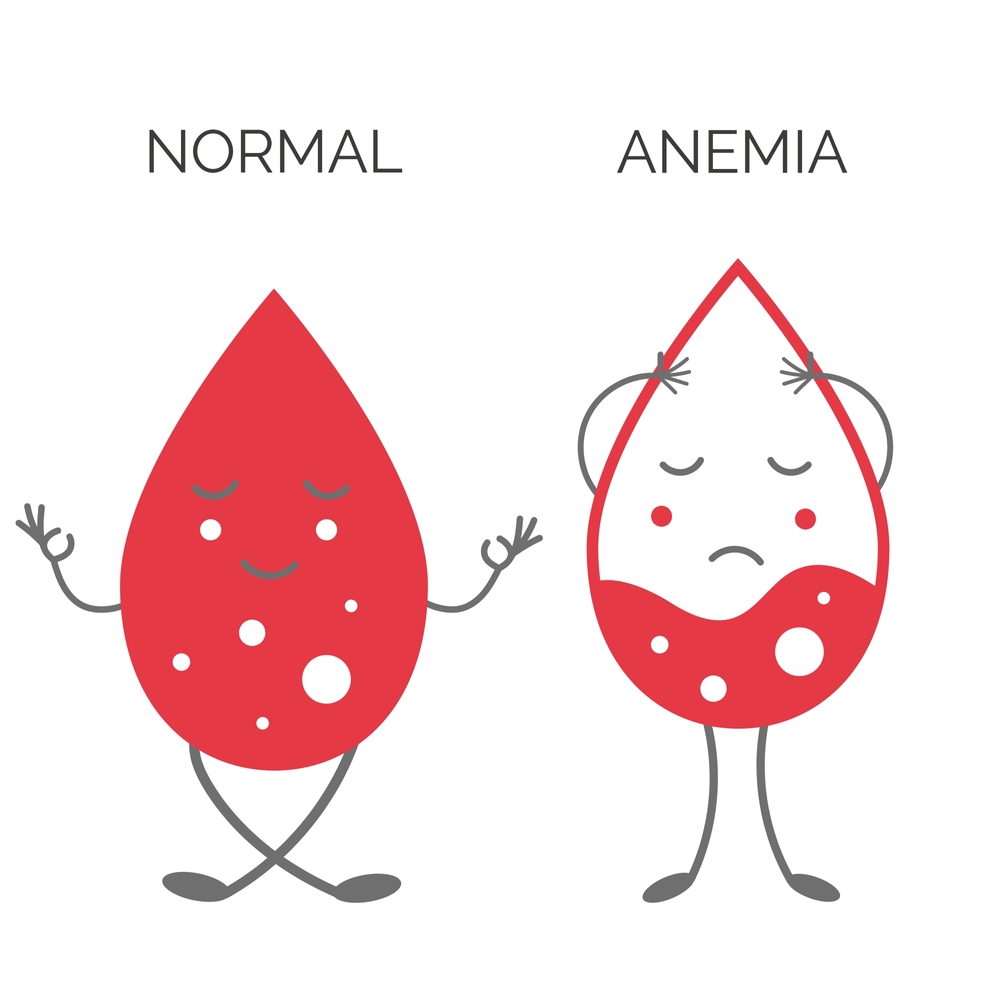
Prolonged iron deficiency can lead to:
Condition | Description |
Iron-deficiency anaemia | Fatigue, pallor, and shortness of breath due to insufficient red blood cells. |
Developmental delays in children | Delayed milestones in cognitive and physical development in children. |
Weakened immunity | Increased exposure to infections due to impaired immune system. |
Reduced productivity and quality of life | Persistent fatigue makes concentrating and performing daily tasks difficult. |
The persistence of iron deficiency for a long period can affect all vital systems of the body. And lead to life-threatening conditions.
Complications of Iron Deficiency
If left untreated, iron deficiency can lead to severe complications such as:
Cardiovascular issues | Arrhythmias, shortness of breath & heart failure. |
Pregnancy complications | Premature birth, low birth weight, and postpartum depression. |
Poor recovery process | Impaired wound healing and weakened immune response. |
How to Diagnose Iron Deficiency?
Iron deficiency symptoms include:
- Paleness
- Fatigue
- Low energy levels
- Feeling cold
- Confusion & dizziness
- Headaches
Consult a specialist if you notice any of these symptoms. The practitioner will assess your condition and make a medical diagnosis. A complete blood picture (CBC) test is also required to confirm the diagnosis.
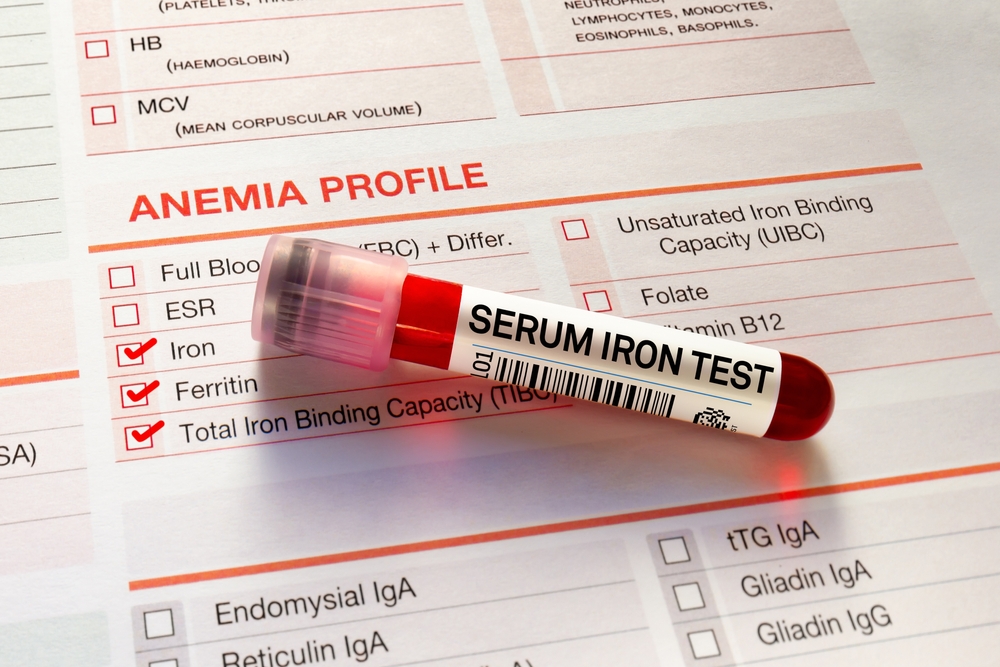
What Iron Level Requires an Iron Infusion?
Well, the need is not decided upon iron levels but the type of condition. Some conditions affect iron levels to smaller extent but have serious complications, So, they need a quicker and more effective treatment in the form of infusion.
There are also other factors involved. So, the doctor decides after a thorough observation of person’s overall health picture.
Oral Supplements vs Iron Infusion
When a deficiency is diagnosed, first line of treatment is iron supplements.
But they can take several months to replenish iron levels. Some people cannot tolerate the side effects of supplements like nausea, constipation, and a metallic taste. So, iron infusion therapy is a more suitable and efficient option for them than supplements.
Furthermore, supplements are not considered in some specific conditions including:
- Bleeding in gastrointestinal tract (gut).
- Inflammatory bowel disease.
- Kidney dialysis & blood loss caused by it.
- Severe iron deficiency anaemia.
- Celiac disease (gluten intolerance).
- Ongoing cancer treatment.
- Vascular condition with loss of blood.
Any individual with these issues or after a faster improvement requires an iron infusion.
Iron Infusion Vs Iron Injection
Iron injection is another available option to cover up for deficiencies. The iron is introduced to the body in an instant via intermuscular (IM) injection (usually in buttock). But this faster administration is difficult to tolerate for the body.
Iron injection can also cause the skin discolouration and intermuscular bleeding. That’s why most health practitioners prefer iron infusion as a safer option.
How Iron Infusion Work: Complete Process

It involves a precise process in a clinic or hospital under strict medical supervision. If you are well aware of the proceedings and know how to cooperate with the staff. The infusion process will be safer, more comfortable and more effective for you.
Preparation Before an Iron Infusion
Your doctor will confirm the diagnosis of iron deficiency and decide the dose according to your condition. The process will be explained to you & consent will be taken. There’s no need to fast or skip medications on the day of infusion.
Tips to Get Prepared
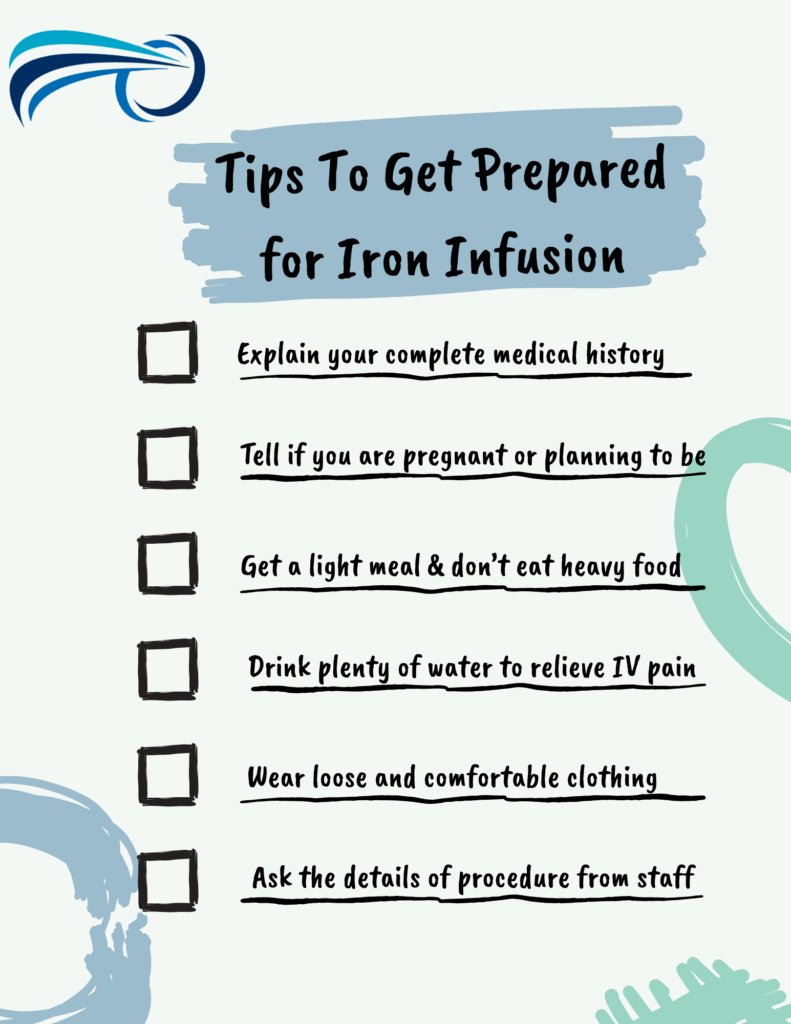
What Happens During an Iron Infusion?
The healthcare provider will:
- Add the recommended dose of iron to a saline solution
- Insert a small needle into one of your veins. E.g. in your arm.
- Administer a test dose is to check the tolerance of body (if it is your first infusion).
- Then administer the required dose of iron to your bloodstream via slow drips.
- Monitor the process periodically for any side effects.
How long does an iron infusion last for?
The process can take from 30 minutes to 4 hours, depending on the dose. Patient needs to remain seated during this time.
Tips for the Patient during Procedure
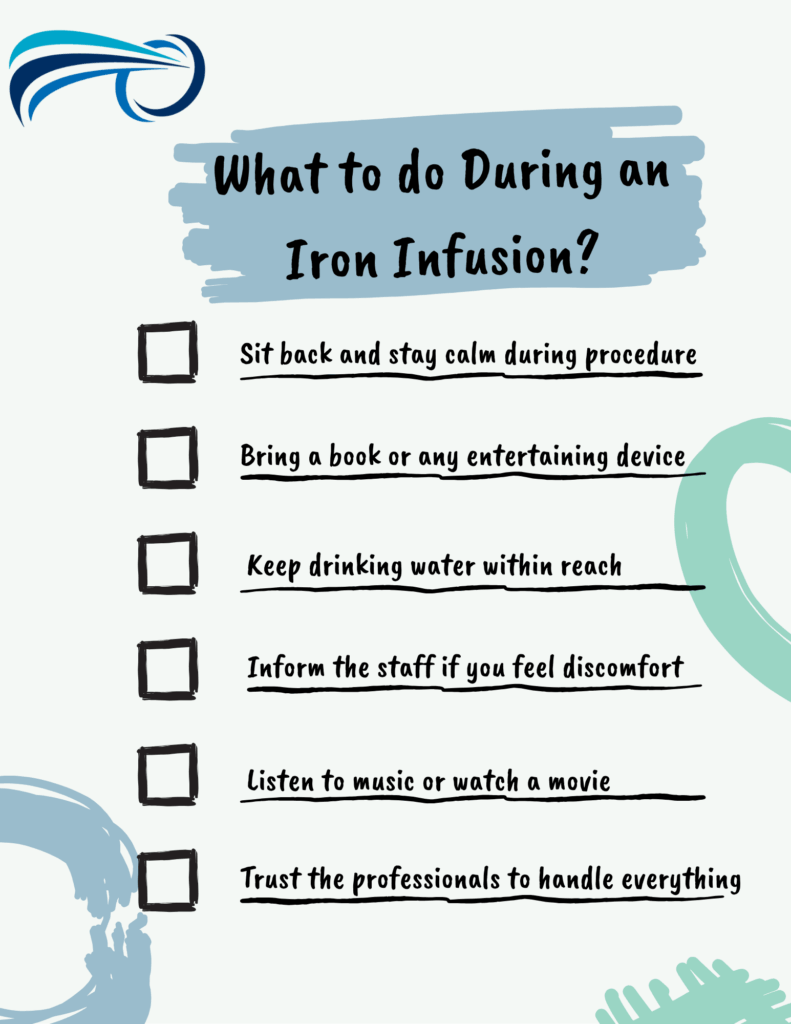
After Care
You will be kept under observation for some time after the infusion. Then some follow-up tests will be recommended to check the effectiveness of infusion.
Things to Do After Your Iron Infusion
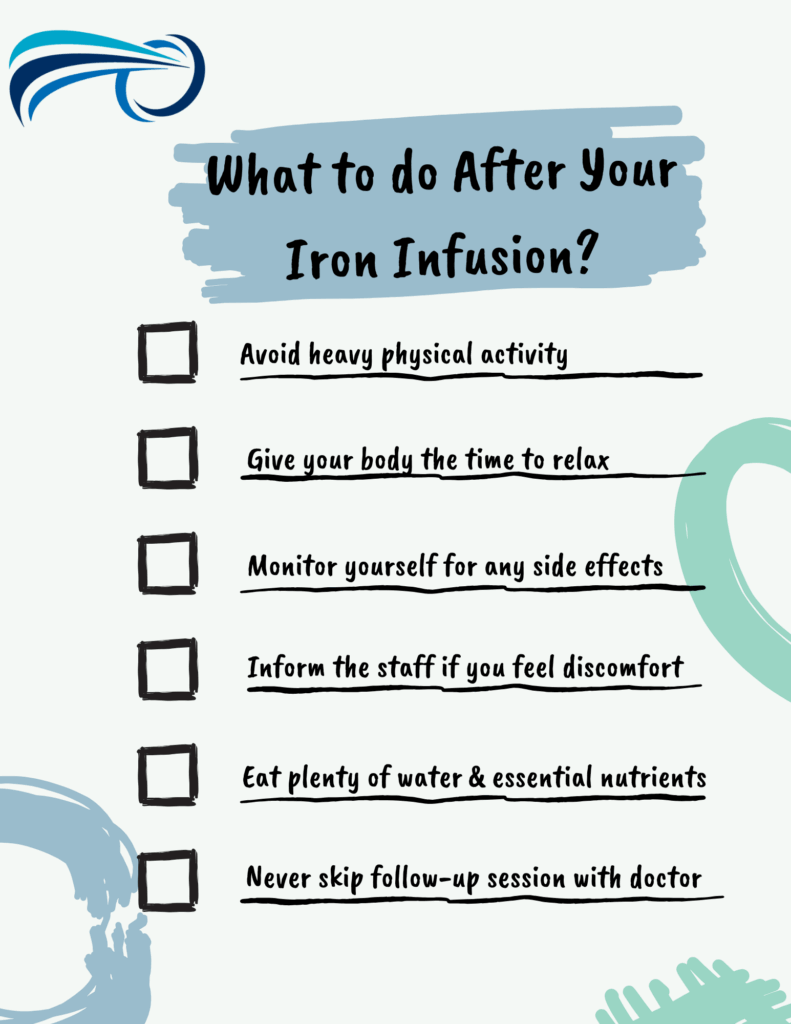
How Many Iron Infusions Do You Need?
The number of infusions depends upon your deficiency level. If your iron levels are slightly lower, one dose of can manage it.
But in case of severe depletion, you’ll need two or three doses. They will be administered with a gap of several weeks to prevent side effects. Conditions like anaemia will require two months to be treated. So, treatment will continue until your iron level is where it should be.
Benefits of Iron Infusion
It offers several advantages for chronic deficiencies or absorption issues. E.g.
Benefit | Description |
Rapid replenishment | It increases the body’s iron levels faster than supplements or dietary changes. |
Effective treatment for severe deficiency | Patients with severe anaemia needing immediate correction of low iron levels can benefit from it. |
Fewer digestive side effects | Bypasses the gastrointestinal tract, avoiding issues like nausea and constipation. |
Improved energy and well-being | Improvements in fatigue, focus, and physical stamina are reported. |
Preventing Complications | Timely management and replenishment of iron levels will eliminate the risk of complications. |
You can experience these benefits within a few days or weeks after your final infusion dose. But, they can only last if you improve your diet & lifestyle.
Now let’s talk about the risks or side effects involved in the process.
Are There Any Side Effects of the Iron Infusion?
Yes, despite being a safe & efficient procedure, there is a risk of some side effects to occur. Common ones include:
Mild Side Effects | Serious Side Effects (Rare) |
Headache or dizziness | Allergic reactions (Anaphylaxis) |
Change in tasting sense (metallic taste) | Low blood pressure |
Mild swelling or redness at the injection site | Difficulty in breathing |
Nausea and vomiting | Shock |
Pain in muscles & joints | Loss of consciousness |
Rash & itchiness |
The doctors will give you a safe test dose prior to the process to be assured of its safety. If any side effect appears during treatment, immediate cessation can prevent it.
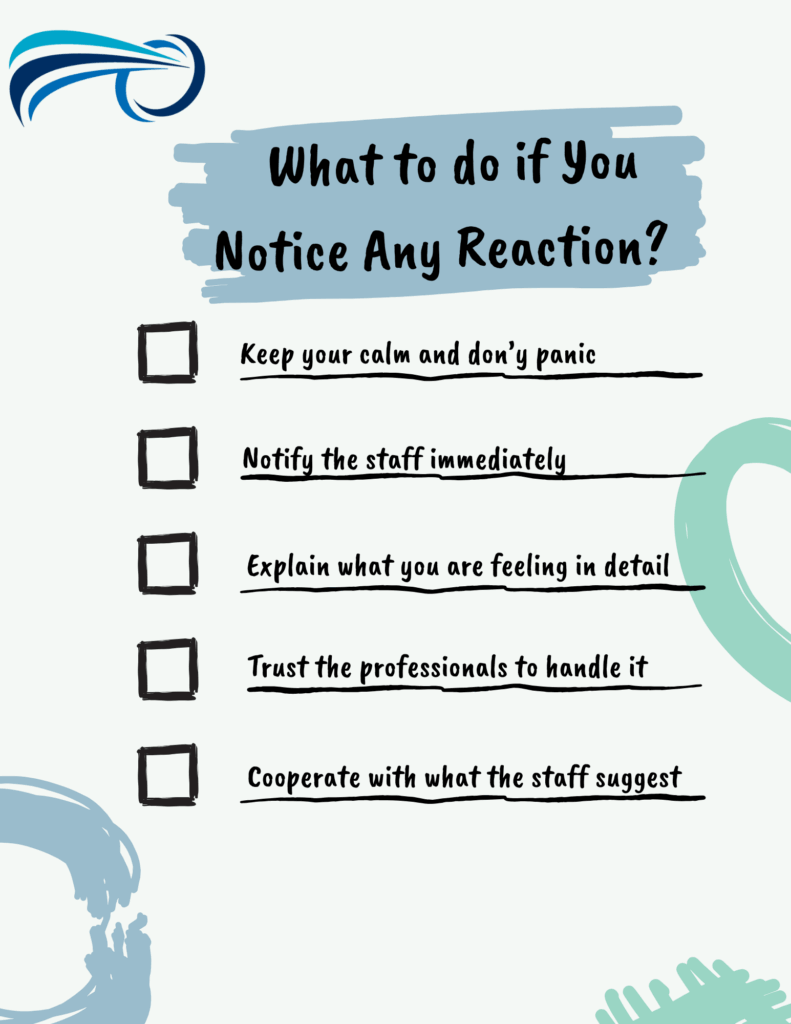
However, the procedure is generally considered safe and research have proved that the adverse events with IV iron are minor, infrequent and short-lasting as compared to the ones with supplements.
Is it Safe to Get Iron Infusion in Pregnancy?
The need for iron in body increases during pregnancy due to increased blood volume. Plus, development of foetus also absorb iron from the mother’s body.
According to research:
The iron requirement for body during an average pregnancy is approximately 1,000 mg. Because approx. 350mg iron is absorbed via placenta and 250mg is lost during delivery. (Source)
That’s why, almost all prenatal prescriptions include iron supplements. But your practitioner can also suggest an infusion if quicker replenishment is required or there’s a risk for gastrointestinal problems.
Iron infusion in first trimester is debated for safety. But you can go for it in the 2nd & 3rd trimester worry free. It is completely safe and required to cope with rapid depletion of iron stores in body.
Searching for Reliable Iron Infusion Services in Perth?
Book Your Iron Infusion at Iluka Medical Centre
At Iluka Medical Centre, we combine expert medical care with compassionate support. To provide you with quality healthcare services.
Our experienced team is well-equipped for advanced treatments like iron therapy. That too in a welcoming, patient-focused environment.
Conveniently open seven days a week. We also offer bulk billing for eligible patients and ample free parking. Take charge of your health and let us help you feel your best!
Disclaimer
The information provided on the Iluka Medical Centre website and blog is for general informational and educational purposes only. It is not a substitute for professional medical advice, diagnosis, or treatment.
While we make every effort to ensure the accuracy and timeliness of the content, Iluka Medical Centre does not guarantee that all information is complete, current, or error-free. Any reliance on the material provided is strictly at your own risk.
For personal medical concerns or decisions regarding your health, medications, or lifestyle, please consult a qualified healthcare professional.
Iluka Medical Centre accepts no responsibility for any loss, injury, or outcome resulting from the use of, or reliance on, the information presented on this website.
